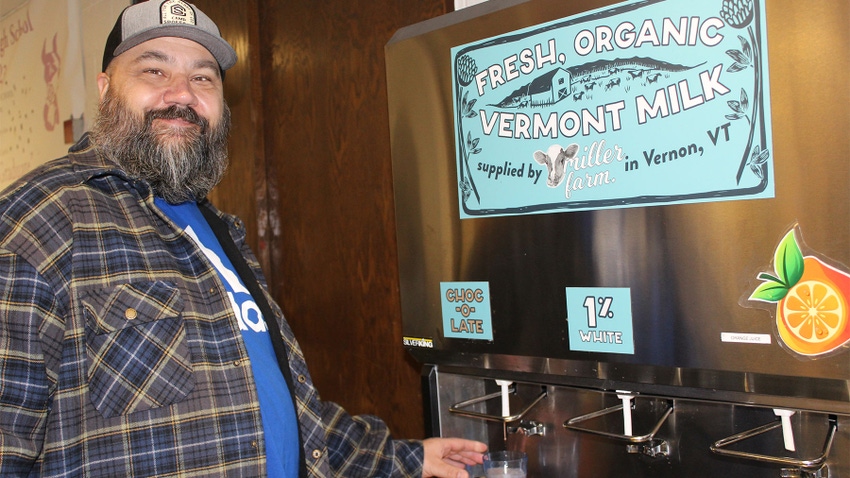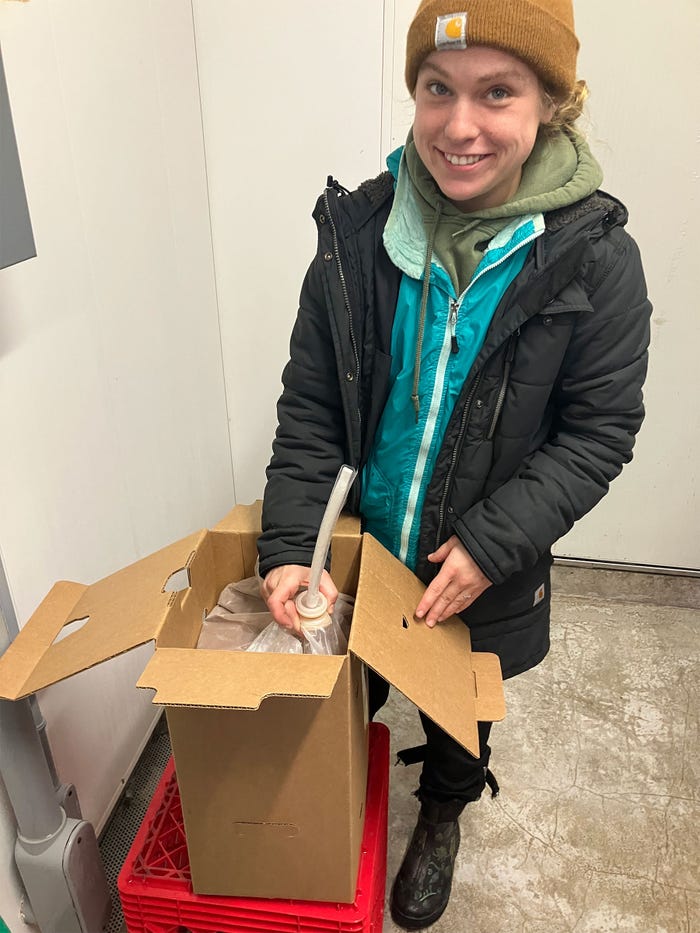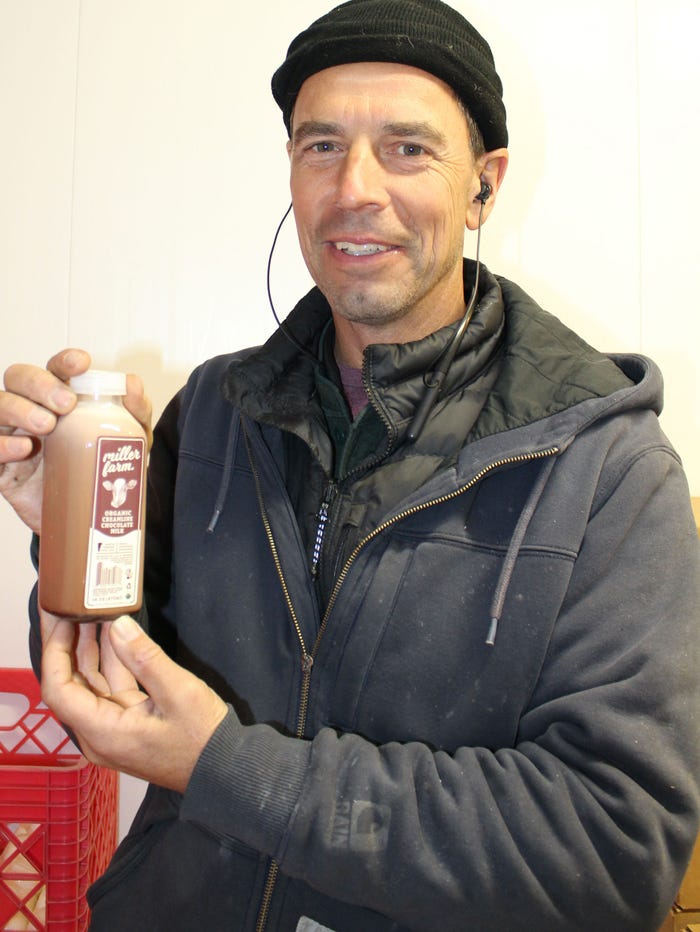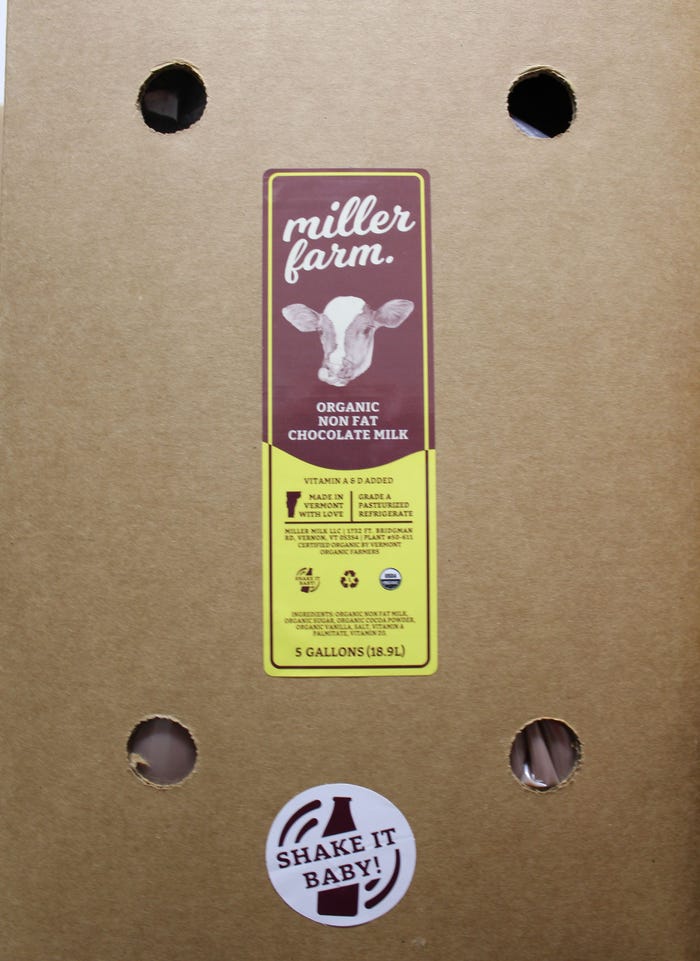December 20, 2023

At a Glance
- Miller Farm delivers milk in boxes to local schools.
- Dispensers at school replace cartons.
- The pilot program cuts down on waste by 65%.
“Seeing a little kid fill up their cup with fresh, wholesome milk, provided by someone who is master of their craft, that feels so good,” says Harley Sterling, director of nutrition services for the Windham Northeast Supervisory Union. “It’s as wholesome as you can get. That’s really what this program is about.”
He’s talking about a pilot program that is serving up fresh, organic white and chocolate milk from Miller Farm in Vernon, Vt., to district school students. Instead of students getting a pint of white or chocolate milk to go with their lunch, schools have installed milk dispensers where students get a cup and fill up on milk as they please. The dispensers are filled with plastic bags of milk provided by Miller Farm.
It started this school year and has already cut the district’s packaging waste by 65%, and it has offset the increased cost of bringing in organic milk, Sterling says. Even better, it’s introducing schoolchildren to great-tasting, fresher milk.

FILL ‘ER UP: Kylee Greenwood works on the weekly chore of filling bags in a box.
The program is funded by a $175,000 grant from the Northeast Dairy Business Innovation Center, housed in the Vermont Agency of Agriculture, Food and Markets. Miller Farm is using the money for new equipment, specifically two 150-gallon pasteurizing vats and a second small-scale processing plant constructed from a converted shipping container.
“We have met some basic demand with existing facilities, but with shaky equipment. We are ... paying staff to wait around, and that’s incredibly inefficient,” Peter Miller says. “With the new vats, we can potentially be able to have better labor utilization. So, the pilot program is helping us with that, mostly new equipment.”
After pasteurization, milk is poured into plastic bags, which are cased in cardboard boxes — 5-gallon “bags in a box.” Each week, Miller delivers 200 gallons of milk in boxes to five Windham Northeast Supervisory Union schools.
Peter and his brother, Art, are the farm’s fifth generation, along with a partner, Keith Franklin. Their retail products include whole milk, chocolate milk, maple milk, coffee milk, half and half and heavy cream, as well as 8-ounce bottles of milk sold to Grace Cottage Hospital and the University of Vermont — they are official sponsors of UVM athletics. The remaining fluid milk is shipped to Stonyfield Organic.
The pilot program is just the opposite of Peter’s original “small container, large volume” business goal for retail dairy sales. When Miller Farm began selling milk retail in 2020, the plan was to bottle milk in small containers.
“You have to be a little bit more creative in the organic industry,” he says. “Only so many people will pay $8 for a gallon of organic milk; that’s why we don’t sell milk in gallons or half-gallons.”
While the ingredient cost of organic milk is twice that of conventional, the containers, labor and other fixed costs are the same. So, there is more profit in smaller containers, he says.
Miller says the program shows how processing bulk milk can be scaled down for small dairies.
“I really believe in this model and seeing it replicated,” he says. “I want other dairies in on it, not just ours. Even a 20-cow herd could sign up their local school district and provide bags in a box through a micro-processing plant.”
Waste cut by 65%
One fact stands out, Sterling says: “It’s plain to see that waste is phenomenally reduced. When kids have an opportunity to grab something, they just grab it, so a percentage of the cartons are thrown away unopened; a greater percentage are thrown away half full.”
With bulk dispensers, students pour their own milk. “They have to make that decision to be interested, to want the milk,” he says.
Bulk milk is fresher and tastes better than in small cartons, which may be heated and cooled at different rates and placed in different parts of a delivery truck, Sterling says. Although the 50-pound bags in a box are heavy, logistics are more streamlined and spoilage is down, too.
“We have a lot of system building into recouping leftover milk,” he says. “We freeze any leftover milk and make it into cheese sauce.”
Still, bulk milk is not profitable for Miller Farm. And that bothers Sterling. Bottom line: Miller needs more bulk customers.
“The pilot is working,” Sterling says. “The spirit of it is, can you serve organic milk at 70% higher cost and offset that with waste reduction? The answer is a resounding yes. But we’re Miller Farm’s only bulk customer. We’re not big enough to be the sole customer. If we could scale it up to double, things would be humming along.”

MAKING CONNECTIONS: “One of the most important things to me ... is that we get people connected to where their food comes from,” dairy farmer Peter Miller says.
Another problem for the dairy is the variability of school demand. When schools call for an early dismissal or schedule an in-service, or if school’s out for the holidays, that means no students and no school lunches. Nevertheless, one by one, more schools in southern Vermont are signing on to the pilot program.
The project started after Horizon Organic ditched its contracts with 89 Northeast organic dairies two years ago. Gary Hirshberg, founder of Stonyfield Organic, began an effort to boost demand for local organic milk, which led to the Northeast Organic Farm Family Partnership. Its initial goal was to get consumers to pledge to buy local organic milk.
“But it was the institutional sales that really took off,” Sterling says.
Teaching good food
Miller and Sterling take the long view. They don’t want to just sell milk and eliminate waste. They want to change how young people think about food and how they eat.
“I hate seeing food waste,” Miller says. “Nothing offends me … more than seeing someone take two bites out of a hamburger and throwing it away. Because I probably knew that cow. Everyone should see at least one animal slaughtered in their lifetime.
“We are pampered by a super-abundance of food in this country,” he adds. “One of the most important things to me, and I made a big deal out of it, is that we get people connected to where their food comes from.”

MIX IT: Miller Farm produces non-homogenized milk called “creamline,” so a “Shake it Baby” label on every bottle and box reminds customers to shake vigorously.
Last October, students from five local schools spent a day at Miller Farm, touring the milking parlor, making butter from cream, drinking milk and eating a hot lunch served by Sterling.
“The hope is that, by the time they get to high school, they’ve learned to go to the salad bar, they know what good food is,” Sterling says.
Harlow writes from Vermont.
Read more about:
EducationAbout the Author(s)
You May Also Like




